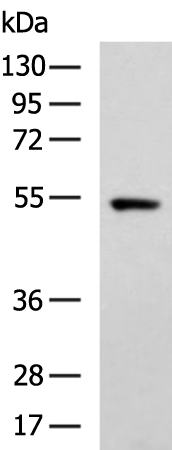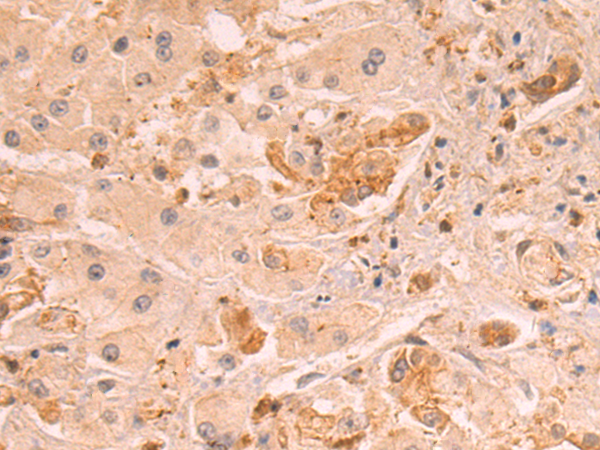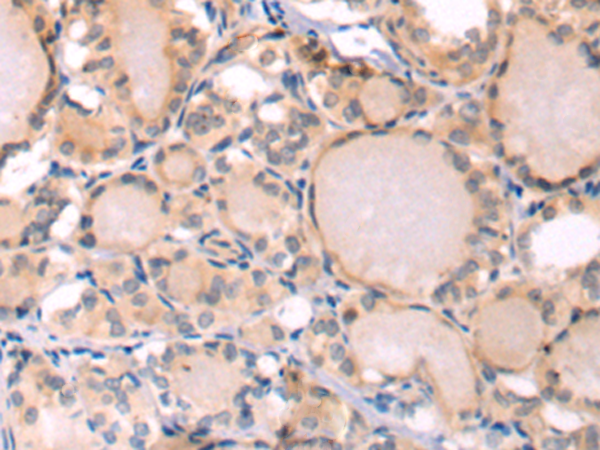


| WB | 咨询技术 | Human,Mouse,Rat |
| IF | 咨询技术 | Human,Mouse,Rat |
| IHC | 1/100-1/200 | Human,Mouse,Rat |
| ICC | 技术咨询 | Human,Mouse,Rat |
| FCM | 咨询技术 | Human,Mouse,Rat |
| Elisa | 1/5000-1/10000 | Human,Mouse,Rat |
| Aliases | LNIR; PRR4; EDSS1; PVRL4; nectin-4 |
| WB Predicted band size | 55 kDa |
| Host/Isotype | Rabbit IgG |
| Antibody Type | Primary antibody |
| Storage | Store at 4°C short term. Aliquot and store at -20°C long term. Avoid freeze/thaw cycles. |
| Species Reactivity | Human, Mouse |
| Immunogen | Fusion protein of human NECTIN4 |
| Formulation | Purified antibody in PBS with 0.05% sodium azide and 50% glycerol. |
+ +
以下是3篇关于 **NECTIN4抗体** 的参考文献摘要整理:
---
1. **文献名称**:*Enfortumab Vedotin in Nectin-4–Expressing Cancers: A Phase I Study*
**作者**:Rosenberg JE, et al.
**摘要**:该研究报道了抗体偶联药物Enfortumab Vedotin(靶向NECTIN4)在晚期实体瘤患者中的首次人体试验结果。结果显示,药物在尿路上皮癌等NECTIN4高表达肿瘤中表现出显著抗肿瘤活性,支持进一步临床开发。
---
2. **文献名称**:*Nectin-4: A Novel Therapeutic Target for Antibody-Based Cancer Treatment*
**作者**:Takai Y, Miyoshi J.
**摘要**:综述了NECTIN4在多种癌症(如膀胱癌、乳腺癌)中的过表达现象及其作为治疗靶点的潜力,重点讨论了靶向NECTIN4的抗体药物(如Enfortumab Vedotin)的作用机制和临床前/临床研究进展。
---
3. **文献名称**:*Expression and Prognostic Significance of Nectin-4 in Invasive Bladder Cancer*
**作者**:Challita-Eid PM, et al.
**摘要**:研究通过免疫组化分析发现,NECTIN4在膀胱癌组织中高表达且与不良预后相关,支持其作为治疗靶点的合理性,并验证了靶向NECTIN4的抗体在临床前模型中的有效性。
---
如需具体文献原文,可通过PubMed或Sci-Hub输入标题/DOI获取。
Nectin-4. a cell adhesion molecule belonging to the nectin family, plays a role in cell-cell junction formation and signaling. It is physiologically expressed in epithelial tissues but is frequently overexpressed in various cancers, including urothelial, breast, and lung carcinomas. This tumor-specific overexpression makes Nectin-4 an attractive therapeutic target.
Nectin-4-targeting antibodies, particularly antibody-drug conjugates (ADCs), have gained prominence in oncology. Enfortumab vedotin, an ADC composed of a monoclonal antibody against Nectin-4 linked to the cytotoxic agent monomethyl auristatin E (MMAE), is a landmark example. Approved for metastatic urothelial cancer, it selectively delivers chemotherapy to Nectin-4-expressing tumor cells, minimizing systemic toxicity.
Mechanistically, the antibody binds to Nectin-4 on cancer cells, triggering internalization and intracellular release of MMAE, which disrupts microtubules and induces apoptosis. Clinical trials demonstrated significant response rates and prolonged survival in refractory patients. However, challenges like acquired resistance and side effects (e.g., skin rash, neuropathy) underscore the need for further optimization.
Research continues to explore Nectin-4 antibodies in combination therapies and other cancer types, leveraging their potential for precision oncology while addressing current limitations.
×